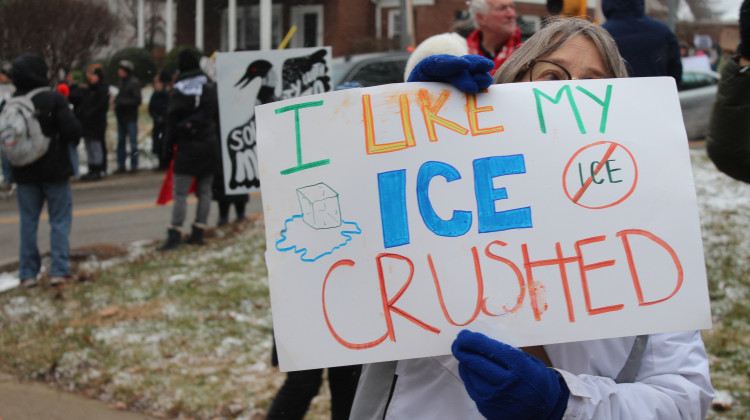
The city is expecting thousands of visitors to experience the solar event in central Indiana.
File Photo: WFYIIndianapolis is squarely in the path of totality for next month’s solar eclipse. The city is expecting thousands of visitors to experience the solar event in central Indiana.
WFYI’s Jill Sheridan sat down with Visit Indy’s Morgan Snyder to hear about what Indianapolis can expect.
Jill Sheridan: Can you talk a little bit about why Indianapolis is looking like one of the very top spots for tourists and visitors.
Morgan Snyder: We are the spot to see the solar eclipse. It's incredible, you know, we are so centrally located within the country, and within the path of totality, as one of the largest cities in the path of totality, we know that people are choosing Indianapolis as their place to see this really unique celestial event.
Sheridan: And it's gonna be pretty incredible. From what I hear, I've never seen a total eclipse of the sun. Do we have any idea how many people are we expecting in Indianapolis or any kind of impact that we might expect?
Snyder: So we are anticipating over 100,000 people coming into the city to watch the eclipse. Now that's Indianapolis… I think the state will see a large influx in some of our donut counties. And when it comes to economic impact, it's so hard to predict at this point.
And it's, you know, this is a new event for us. We have done so much research with the cities and towns that were in the path of totality for the last solar eclipse, which was 2017. Columbia, South Carolina has been such a great resource for us. We know that Columbia, South Carolina, had a $48 million dollar economic impact, a smaller destination than us.
And what is very interesting when looking at the 2017 solar eclipse, is what we're about to experience here in the city. There are more people that live within the path of totality in the 2024 solar eclipse, the duration of totality is much longer than it was in 2017.
And you just have so many more densely populated cities and the path of totality for 2024. So even in looking at 2017 numbers, we really anticipate those being increased for 2024.
Sheridan: So if somebody hasn't made their plans yet, is it too late? Will they be able to find out anywhere to stay in Central Indiana?
Snyder: It's not too late. In fact, we have heard - and it gives me anxiety just to even think about this - but we have heard that many people look at the 10-day forecast and decide where they want to be for the solar eclipse.
And I understand that because this is a very weather dependent event. We do have hotels that still have availability, we have Airbnb and short term rental properties with some availability. But what we have seen is the demand is there. And we do anticipate a sell out.
Airbnb came out and said, We are the number one most booked destination in the path of totality for that Sunday, Monday booking.
Sheridan: A lot of events that are planned, you know, what can people expect? How can people sort of pick where they want to go?
Snyder: We are tracking nearly 60 events across the city to celebrate the solar eclipse, you know, customize restaurant menus, and there's about 10 bars and restaurants that have customized cocktails on their menus.
But then you have some of the big activation zones like Newfields, the Indianapolis Motor Speedway and what they're doing to partner with NASA, NASA coming out and saying Indy is only one of three official viewing destinations in the country for the path of totality. Of course, downtown White River State Park, their Lunacy Festival, this is a free festival. They'll have activations all day long.
So you do need to plan where you're going to be for the solar eclipse. We're really encouraging eclipse enthusiasts to find one spot, get there early, make a full day of it. And whatever you do, do not leave immediately after the solar eclipse. We've asked all of our events to increase programming beyond that 3:06pm timeframe when we're going to see that totality start.
We want traffic to trickle out because that's one thing we've learned from some of the other destinations in 2017. Everyone leaves immediately following the eclipse and then it creates some traffic congestion. And so that's something we're working really hard with our IMPD team Homeland Security to just really ensure a safe viewing experience in the city.
Sheridan: I really appreciate you coming in to talk a little bit more about what's happening here in Indianapolis. Thanks.
Snyder: Absolutely. Thank you.
Contact WFYI city government and policy reporter Jill Sheridan at jsheridan@wfyi.org.
 DONATE
DONATE






 Support WFYI. We can't do it without you.
Support WFYI. We can't do it without you.